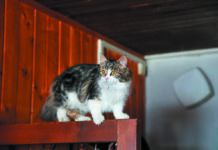You may have heard the news that in the last 3 years, cats started more than 100 house fires in the South Korean capital of Seoul. According to the Korea Herald, about half of them occurred while the owners were out. In some cases people were injured.
What you may not know is that in the U.S., more than 1,000 fires every year are started by pets, according to American Humane. The animal welfare organization doesn’t break it down by species, but since there are more pet cats than pet dogs in this country, it’s not hard to make an extrapolation about fire-starting among our feline companions.
The main problem is stoves.
“An accidental nudge of a stove knob is the number one cause of house fires started by pets,” American Humane says.
The Seoul Metropolitan Fire & Disaster Headquarters concurs, reporting that cats were believed to have started the blazes by turning on the stoves in their kitchens with their paws. In South Korea, it appears to have been electric stoves that caused the lion’s share of the fires. If those appliances have touch-sensitive buttons, they can all too easily be activated by an animal’s paw.
Preventing felines from starting fires
American Humane says that if your stove has knobs, you should put covers on them or remove them (and, presumably, light the stove by turning the metal stem with your fingers). When it comes to button-activated electric stoves, you can cover the stove tops when they’re not in use. Some electric stoves with button controls also have a feature that allows you to lock the buttons, which can keep both cats and young children from activating them.
Other ways to keep a cat or other pet from inadvertently starting a fire, according to American Humane:
- Reduce open-flame exposure – cats are curious and may try to investigate your unattended candles or fireplace. Opt instead for flameless candles or an enclosed fireplace to prevent an accidental knock.
- Secure loose wires — a cat may want to chew on a loose wire or cord.
- Never put a glass bowl on a wooden porch. The sun’s rays can heat the bowl and cause a fire on the wood. When outside, opt instead for ceramic or stainless-steel dishes.




